- Home
- Jodi Picoult
Leaving Time Page 7
Leaving Time Read online
Page 7
“Visions are like metaphors,” Serenity explains.
“Which is pretty ironic, because that’s a simile,” I say.
“What?”
“Never mind.” I pull the blue scarf off my neck. “Wouldn’t it help if you held this?”
I pass it to her, but she rears away like it’s going to give her the plague. The thing is, I’ve already let go of it, and a gust of wind carries it skyward, a tiny tornado spiraling further and further away.
“No!” I scream, and like a shot, I run after it. It dips and rises, teasing me, caught on air currents, but never coming close enough for me to catch. After a few minutes, the scarf gets tangled in the branches of a tree, about twenty feet up. I find a foothold and try to shimmy up the tree, but there are no knots on the bark for toeholds. Frustrated, I fall down hard on the ground, tears stinging my eyes.
There’s so little I have of her.
“Here.”
I find Serenity crouched beside me, her hands laced together to give me a leg up.
I scratch my cheek and my arms as I climb; my fingernails break as I dig them into the bark. But I manage to get high enough to reach the first notch made by a branch. I scrabble around with my hand and feel dirt and twigs, the abandoned nest of an enterprising bird.
The scarf is caught on something. I pull, finally tugging it free. Leaves and sticks rain down on me, on Serenity. And something more substantial smacks me on the forehead as it falls to the ground.
“What the hell is that?” I ask, as I wrap my mother’s scarf around my neck again, and tie it tightly.
Serenity stares down at her palms, astounded. She hands me the thing that fell.
It’s a cracked black leather wallet with its contents still intact: thirty-three dollars. An old-style MasterCard with those Venn diagram circles. And a New Hampshire driver’s license, issued to Alice K. Metcalf.
It is evidence, real, honest to God evidence, and it’s burning a hole in the pocket of my shorts. With this, I can prove that my mother’s disappearance might not have been of her own free will. How far could she have gone without any money or credit cards?
“Do you know what this means?” I ask Serenity, who has gotten very quiet now that we’ve hiked back to her car and started driving into town. “The police can try to find her.”
Serenity glances at me. “It’s been ten years. It’s not as easy as that.”
“Yes, it is. New evidence equals a reopened case. Bam.”
“You think that’s what you want,” she says. “But you may be surprised.”
“Are you kidding me? This is what I’ve dreamed of for … well, as long as I can remember.”
She purses her lips. “Every time I used to ask my spirit guides questions about what it was like in their world, they’d make it clear there were some things I wasn’t supposed to know. I thought it was to protect some big cosmic secret about the afterlife … but eventually I realized it was to protect me.”
“If I don’t try to find her,” I tell her, “then I’ll spend my whole life wondering what would have happened if I did.”
She stops at a red light. “And if you find her—”
“When,” I correct.
“When you find her,” Serenity says, “are you going to ask her why she didn’t come looking for you all these years?” I don’t answer, and she turns away. “All I’m saying is if you want answers, you better be ready to hear them.”
I realize that she’s driving right past the police station. “Hey, stop,” I cry out, and she slams on the brakes. “We have to go in there and tell them what we found.”
Serenity pulls over to the curb. “We don’t have to do anything. I reported my vision to you. I even drove you all the way to that state park. And I’m happy you got what you wanted. But I personally do not need or want to become involved with the police.”
“So that’s it?” I say, stunned. “You throw information into someone else’s life like a grenade and you walk away before it explodes?”
“Don’t shoot the messenger.”
I don’t know why I’m surprised. I don’t know Serenity Jones at all, and I shouldn’t expect her to help me. But I’m sick and tired of people in my life abandoning me, and she will be just one more. So I do what is easiest, when I feel like I’m in danger of being left behind. I make sure I’m the one to walk away first. “No wonder people hated you,” I say.
At that, her head snaps up.
“Thanks for the vision.” I get out of the car, untangling my bike from the backseat. “Have a nice life.”
I slam the door shut, park my bike, and walk up the granite steps of the police station. I approach the dispatcher inside the glass booth. She is maybe a few years older than me, a recent high school grad, and she is wearing a shapeless polo shirt with a police logo on the chest, and too much black eyeliner. On the computer screen behind her, I can see that she’s been checking her Facebook page.
I clear my throat, which I know she can hear since there’s a little grid in the glass that separates us. “Hello?” I say, but she keeps typing.
I knock on the glass, and her eyes flicker toward mine. I wave to get her attention.
The phone rings, and she turns away from me as if I don’t matter at all and takes the call instead.
I swear—it’s kids like her who are giving my generation a really bad reputation.
A second dispatcher walks toward me. She is a squat older woman, shaped like an apple, with a frizzy blond perm. She has a name tag, POLLY. “Can I help you?”
“Yes,” I say, offering my most mature smile, because really, what adult is going to take a thirteen-year-old girl seriously when she says she wants to report a disappearance that happened a decade ago? “I’d like to talk to a detective.”
“What’s this about?”
“It’s kind of complicated,” I say. “Ten years ago an employee was killed at the old elephant sanctuary, and Virgil Stanhope was investigating it … and I … I really need to talk to him directly.”
Polly purses her lips. “What’s your name, sweetheart?”
“Jenna. Jenna Metcalf.”
She takes off her head mike and walks into a back room I cannot see.
I scour the wall of missing people and deadbeat dads. If my mother’s face had been plastered up there ten years ago, would I even be standing here now?
Polly reappears on my side of the glass wall, entering through a doorway that has a push-button combination lock on its knob. She leads me to a bank of chairs and sits me down. “I remember that case,” she says to me.
“So you know Detective Stanhope? I realize he’s not working here anymore, but I thought you might be able to tell me where he is now …”
“I’m not sure how you’re going to get in touch with him.” Polly puts her hand gently on my arm. “Virgil Stanhope is dead.”
The residential facility where my father has lived since Everything Happened is only three miles from my grandmother’s home, but I don’t go there very often. It’s depressing, because it (a) always smells like pee and (b) has cutouts of snowflakes or fireworks or jack-o’-lanterns taped to the windows as if the building houses kindergartners rather than the mentally ill.
The facility is called Hartwick House, which makes me think of a PBS drama and not the sad reality of superdrugged zombies watching the Food Network in the main lounge as aides bring around tiny cups of pills to keep them placid, or sandbag patients draped slack over the arms of wheelchairs as they sleep off ECT treatments. Most of the time when I go there, I don’t feel scared—just hideously depressed to think that my dad, who used to be seen in conservation circles as something of a savior, couldn’t manage to save himself.
Only once have I been really freaked out at Hartwick House. I was playing checkers with my dad in the lounge when a teenage girl with greasy ropes of hair burst through the double doors holding a kitchen knife. I have no idea where she got it; anything that could be considered a weapon—even shoelaces—is f
orbidden at Hartwick House or kept in cabinets with more security than Rikers Island. But anyway, she outsmarted the system, and she came through the double doors with her crazy gaze locked right on my face. Then she pulled back her arm, and the knife went flying through the air toward me.
I ducked. I slid, boneless, under the table. I covered my head with my arms and tried to make myself disappear while the burly aides tackled and sedated her, before carrying her back to her room.
You’d think a nurse or two would have come by to make sure I was okay, but they were occupied with the other residents, who were screaming and panicking in the aftermath. I was still shaking when I got enough courage to poke my head out and crawl into my seat again.
My father was not screaming or panicking. He was making his move. “King me,” he said, as if nothing at all had happened.
It took me a while to realize that in his world—wherever that was—nothing had happened. And that I couldn’t be mad at him for not caring if I had been carved up like a Thanksgiving turkey by a psycho teenager. You can’t blame someone if they honestly don’t understand that their reality isn’t the same as yours.
Today, when I get to Hartwick House, my father isn’t in the lounge. I find him sitting in his room, in front of the window. In his hands is a bright rainbow of embroidery floss, twisted into knots—and not for the first time I think that someone’s enterprising idea of therapy is another person’s frustrated hell. He glances up at me when I walk in, and he doesn’t go ballistic—which is a good sign that today, he’s not too agitated. I decide to use this to my advantage, and broach the topic of my mother.
I kneel in front of him, stilling his hands as they tug at the floss, tangling it even worse. “Dad,” I say, as I draw the orange thread through the loops of the other colors and drape it over his left knee. “What do you think would happen, if we found her?”
He doesn’t answer me.
I tug free the candy-apple-red thread. “I mean, what if she’s the only reason we’re broken?”
I let my hands grasp his, where they are clasped around two more strands of floss. “Why did you let her go?” I whisper, holding his gaze. “Why didn’t you ever tell the police she was missing?”
My father had a breakdown, sure, but he’s had moments of lucidity in the past ten years. Maybe no one would have taken him seriously if he said my mother was lost. But then again, maybe they would have.
Then, maybe, there would be a missing persons case to reopen. Then I wouldn’t have to start from scratch, trying to get the police to investigate a disappearance that they didn’t even know was a disappearance ten years ago, when it happened.
Suddenly the expression on my father’s face changes. The frustration melts like foam where the ocean hits sand, and his eyes light up. They are the same color as mine, a too-green that makes people uneasy. “Alice?” he says. “Do you know how to do this?” He lifts the handful of thread.
“I’m not Alice,” I tell him.
He shakes his head, confused.
I bite my lip, untangle the strands, and weave them to make a bracelet, a simple series of knots any day camper would know by heart. His hands flutter over mine like hummingbirds as I work. When I’m done, I unclip it from the safety pin that is fastened to his pants and tie it around his wrist, a bright bangle.
My father admires it. “You were always so good at this kind of thing,” he says, smiling up at me.
That’s when I realize why my father did not report my mother as a missing person. Maybe she wasn’t missing, not to him. He’s always been able to find her, in my face and my voice and my presence.
I wish it were that easy for me.
When I get home, my grandmother is watching Wheel of Fortune on television, calling out the answers before the contestants, and giving Vanna White fashion advice. “That belt makes you look like a tramp,” she tells Vanna, and then she sees me in the doorway. “How did it go today?”
I falter a moment before realizing she is talking about babysitting, which of course I didn’t really do. “It was okay,” I lie.
“There are stuffed shells in the fridge if you want to reheat them,” she says, and her gaze flits back to the screen. “Try an F, you stupid cow,” she shouts.
I take advantage of this distraction and run upstairs with Gertie at my heels. She makes herself a nest on my bed out of pillows and turns in circles to get comfortable.
I don’t know what to do. I’ve got information, and nowhere to go with it.
Reaching into my pocket, I take out the wad of bills I brought and peel one of the dollars off. I start folding it mindlessly, seamlessly, into an elephant, but I keep screwing up and finally crumple it into a ball and throw it on the floor. I keep seeing my father’s hands making angry knots in the embroidery floss.
One of the original detectives who investigated the elephant sanctuary has Alzheimer’s. The other is dead. But maybe it’s not the end of the road. I’ll just have to find a way to get the current detectives in the department to see that the department screwed up ten years ago, and should have considered my mother a missing person.
That should go over really well.
I turn on my laptop, and with a buzzy chord, it comes alive. I type in my password and open a search engine. “Virgil Stanhope,” I type. “Death.”
The first article that pops up is a notice about the ceremony where he was going to be made detective. There is a picture of him, too—sandy hair swept to the side, a big, fat, toothy grin, an Adam’s apple that looks like the knob on a door. He looks goofy, young, but I guess ten years ago, that’s just what he was.
I open a new window, log in to a public records database (which costs me $49.95 a year, FYI), and find the death notice of Virgil Stanhope. Tragically, it’s dated the same day as his detective ceremony. I wonder if he got his badge and crashed in a car accident on the way home or, worse, on the way there. A life interrupted.
Well. I can relate to that.
I click on the link, but it won’t open. Instead, I get a page stating there’s a server error.
So I go back to my first search and rummage through the article descriptions until I find one that makes all the hair stand up on the back of my neck.
“Stanhope Investigations,” I read. Find the future in the past.
It’s a crappy slogan. But I still click to open the page in a new window.
Licensed. Domestic and marital relationship investigations. Surveillance services. Bail recovery agent. People searches. Child custody investigations. Accidental death investigations. Missing persons.
There is another button at the top: About Us.
Vic Stanhope is a licensed private investigator and former law enforcement officer and detective. He holds degrees in criminal justice and forensic science from the University of New Haven. He belongs to the International Association of Arson Investigators, the National Association of Bail Enforcement Agents, the National Association of Certified Investigators.
It could be a coincidence … if not for the tiny thumbnail photograph of Mr. Stanhope.
True, he looks older. And true, he has that buzz cut guys get when they’re losing their hair and they try to channel Bruce Willis to look supertough. Yet his Adam’s apple is still front and center in the photo, unmistakable.
I suppose Vic and Virgil could be twins. But still. I grab my cell phone and punch in the number on the screen.
Three rings later, I hear someone grab the receiver on the other end. It sounds like it falls to the floor with a run of static and curses, and then is recovered. “What.”
“Is this Mr. Stanhope?” I whisper.
“Yeah,” the voice growls.
“Virgil Stanhope?”
There is a pause. “Not anymore,” the voice slurs, and he hangs up.
My pulse is racing. Either Virgil Stanhope is back from the dead or he never was dead.
Maybe he just wanted people to think that, so he could disappear.
And if this is the cas
e—he’s the perfect person to find my mother.
ALICE
Anyone who has ever seen elephants come across the bones of another individual would recognize the calling card of grief: the intense silence, the droop of the trunk and ears, the hesitant caresses, the sadness that seems to wrap the herd like a shroud when they encounter the remains of one of their own. But there’s been some question as to whether elephants distinguish between the bones of elephants they knew well and those of elephants they did not.
Some of the research that has been coming out from my colleagues at Amboseli up in Kenya, where they have more than twenty-two hundred elephants that are recognized individually, has been intriguing. Taking one herd at a time, the researchers revealed several key items: a small bit of ivory, an elephant skull, and a block of wood. They did this experiment as one would have in a lab, carefully maintaining the presentation of the objects and recording the responses of the elephants to see how long they lingered at each item. Without a doubt, the tiny piece of ivory was the most intriguing to the elephants, followed by the skull and then the wood. They stroked the ivory, picked it up, carried it, rolled it beneath their hind feet.
Then the researchers presented the families with the skull of an elephant, the skull of a rhino, and the skull of a water buffalo. In this set of objects, the elephant skull was the item that interested the herd the most.
Finally, the researchers focused on three herds that had, in the past few years, suffered the death of their leader. The families were presented with the skulls of those three matriarchs.
You’d think that the elephants would have been most interested in the skull that belonged to the matriarch who had led their own herd. After all, the other parts of the controlled experiment clearly show that the elephants were capable of showing preference, instead of randomly examining the items out of general curiosity.
You’d think that, given the examples I had personally witnessed in Botswana of elephants who seemed deeply moved by the death of one of their own, and capable of remembering that death years later, they would have paid tribute to their own leader.

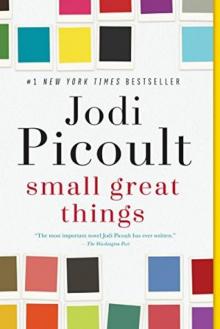 Small Great Things
Small Great Things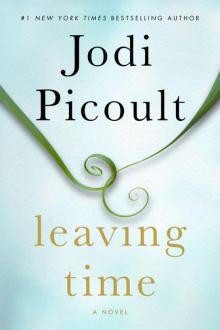 Leaving Time
Leaving Time Nineteen Minutes
Nineteen Minutes Larger Than Life
Larger Than Life Perfect Match
Perfect Match My Sister's Keeper
My Sister's Keeper The Pact
The Pact Handle With Care
Handle With Care Songs of the Humpback Whale
Songs of the Humpback Whale Mermaid
Mermaid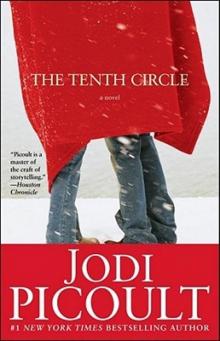 The Tenth Circle
The Tenth Circle The Color War
The Color War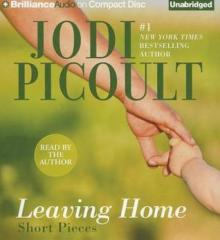 Leaving Home: Short Pieces
Leaving Home: Short Pieces House Rules
House Rules Lone Wolf
Lone Wolf The Storyteller
The Storyteller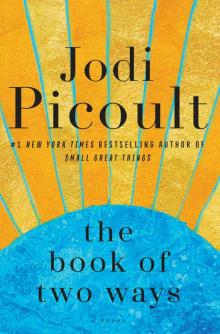 The Book of Two Ways
The Book of Two Ways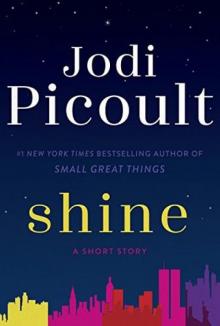 Shine
Shine Off the Page
Off the Page Sing You Home
Sing You Home Second Glance: A Novel
Second Glance: A Novel Mercy
Mercy Vanishing Acts
Vanishing Acts Between the Lines
Between the Lines Plain Truth
Plain Truth Salem Falls
Salem Falls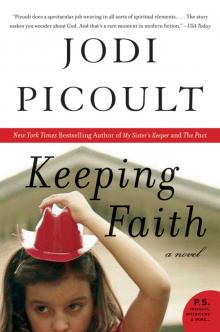 Keeping Faith
Keeping Faith Harvesting the Heart
Harvesting the Heart Change of Heart
Change of Heart Where There's Smoke
Where There's Smoke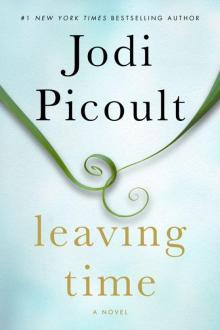 Leaving Time: A Novel
Leaving Time: A Novel Over the Moon
Over the Moon House Rules: A Novel
House Rules: A Novel The Jodi Picoult Collection #2
The Jodi Picoult Collection #2 Leaving Home: Short Pieces (Kindle Single)
Leaving Home: Short Pieces (Kindle Single) My Sister's Keeper: A Novel
My Sister's Keeper: A Novel![Mermaid [Kindle in Motion] (Kindle Single) Read online](http://i1.bookreadfree.com/i1/04/03/mermaid_kindle_in_motion_kindle_single_preview.jpg) Mermaid [Kindle in Motion] (Kindle Single)
Mermaid [Kindle in Motion] (Kindle Single) The Jodi Picoult Collection #4
The Jodi Picoult Collection #4 Sing You Home: A Novel
Sing You Home: A Novel The Jodi Picoult Collection
The Jodi Picoult Collection Lone Wolf A Novel
Lone Wolf A Novel Second Glance
Second Glance Larger Than Life (Novella)
Larger Than Life (Novella) The Jodi Picoult Collection #3
The Jodi Picoult Collection #3